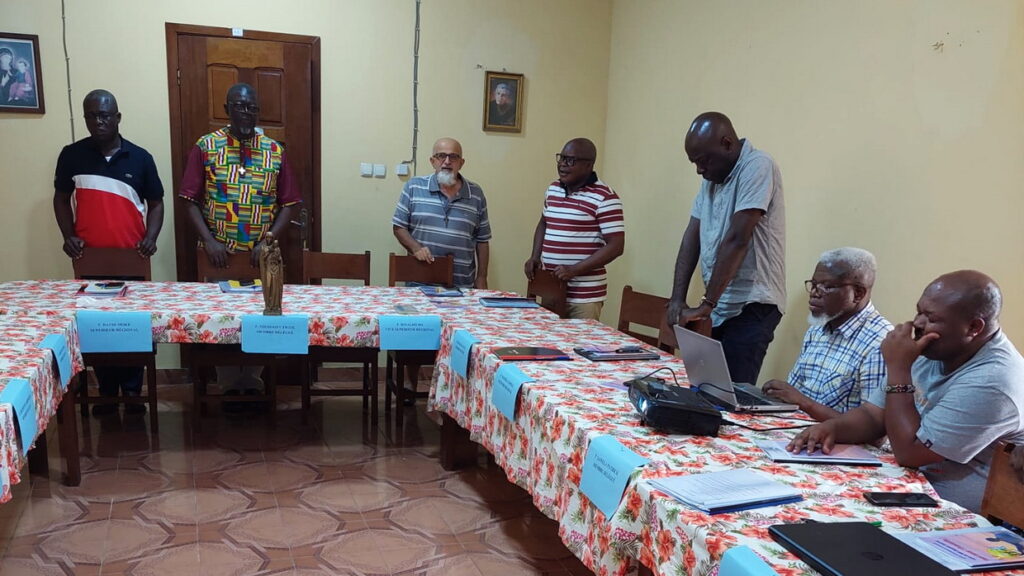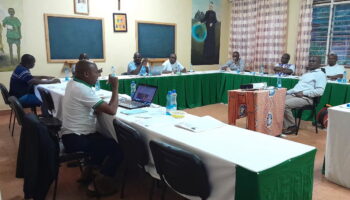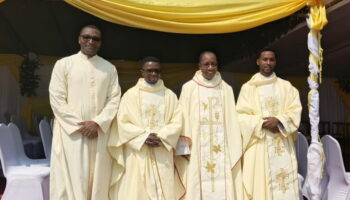
The Conference started on the 8th and will last until 15 April. Having concluded the retreat, the regulations were presented, followed by the reading of the reality, and sharing of the experiences of the IMC communities in the region of Congo: Somana, Neisu, Procure House in Isiro, and Bisengo Mwambe.
By Nhessy Nkulu Iland, Nestor *
In the solemn silence of the Eucharistic Celebration, presided over by Father David Bambilikpinga Moke, Regional Superior of DR Congo, on Friday 12 April, a window was opened on the perspective of the regional conference, inspired by the wisdom of Master Gamaliel, Doctor of the Law. “If this is God’s work, you will not be able to destroy it”, the saying goes, emphasizing the importance of not opposing divine will but rather conforming to it, as Christ did in fulfilling the will of the Father for our salvation through his resurrection.
Father Gianfranco Testa has returned to Italy. It is good to share what he left us these days as a legacy on forgiveness and reconciliation. In summary, the goal of the reconciliation process is to reread the offense in a different way: “When a great friend hurts us, we should write that offense on the sand, where the wind of oblivion and forgiveness will erase it and make it disappear; on the other hand, when something great happens to us, we should engrave it in the stone of the memory of the heart, where no wind in the world can erase it.”
Reconstructing the perception of the offense helps us humanize our offender without justifying the offense itself. “The harmful actions of others can leave indelible scars, but our attitude towards them can change; we can accept and continue in life or deny and preserve suffering. Whoever has offended us is not a criminal, but a person who has committed a crime; not a thief, but a person who has committed theft… seeing them as an individual, we humanize our offender and understand that they were not born a criminal, thief, rapist… because they are more than that; their action against us does not reduce their entire person and does not warp their essence, which remains open to the possibility of change! We do not justify their evil, but we seek to understand the person behind the evil caused”.

In conclusion, “forgiveness is breaking the vicious circle of the offensive image of the past to build a new image. The reconciliation process requires memory, truth, justice, and commitment; often it also requires a mediator. Can I be this mediator? If the one who offended me asks for forgiveness, that is fine; but if they don’t, it doesn’t matter! The important thing is that I have freed myself from the vicious circle that prevents me from progressing in my story, in my life! We look at the past with masks that we must remove to look at reality with new eyes. This is what you see in the photo where we wear masks; the exercise was to remove that mask, tear it off, and decide to look at others with new eyes, especially with the heart”.
“You have a better face! You are not responsible for the face you have, but for the face you present.”
We believe with all our strength: that the family is built from the inside out; that grudges and vengeance paralyze the development of individuals and communities; that non-violence is stronger than violence.
We commit ourselves: to promote the culture of forgiveness and reconciliation as a safe path to peace; to ensure and take on the irrationality of forgiveness rather than the irrationality of violence.

In the Eucharist presided over by Father Rinaldo Do, the Vice Regional Superior (Photo), this Saturday, 13 April, the focus was on the conflicts/problems that emerged in the two readings: the unequal distribution and the turmoil of the sea, where dialogue between the apostles and dialogue with Jesus lead to appropriate solutions. We do not act as we please (self-referentiality) but we dialogue among ourselves, with our laity, to address the problems we encounter in life, not forgetting Christ who is always present in our boat to calm the turbulent waves that disturb our lives.
The day continued with the sharing started the previous day on our communities presented by delegates at the conference: the parish of Saint Joseph of Arimathea, the Antonio Barbero Seminary, the Mater Dei parish, the Regional Directorate, and the Regional Treasury. As yesterday, questions, contributions, and reactions from the brethren followed each sharing to better understand the different realities experienced in our respective life and mission contexts.
The afternoon was dedicated to group work. As there were 12 delegates, they worked in three groups of four. Each of them worked on two topics of the General Chapter to adjust the text of the Instrumentum Laboris and propose a programme to be implemented for each section.
* Fr. Nhessy Nkulu Iland, Nestor, Regional secretary IMC in the DR Congo.



